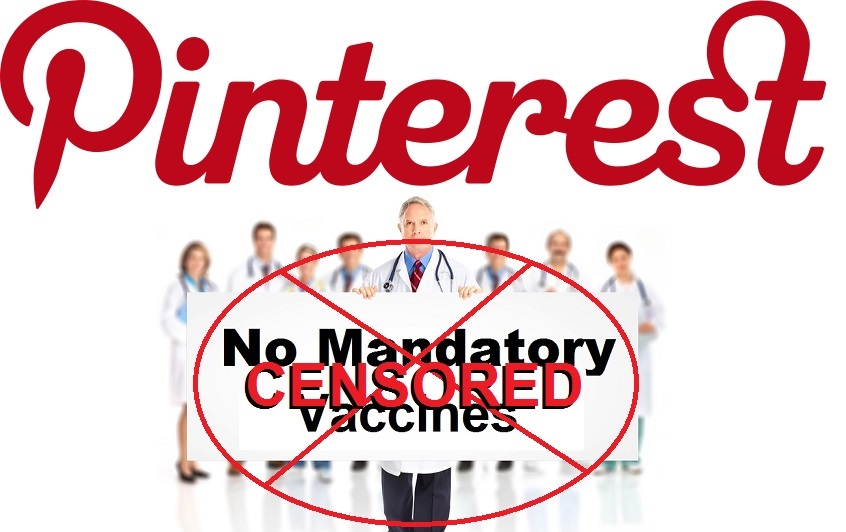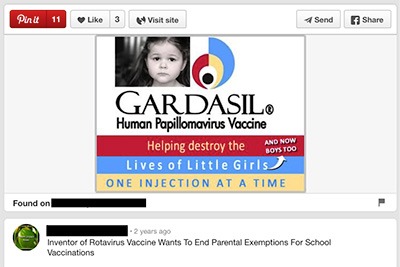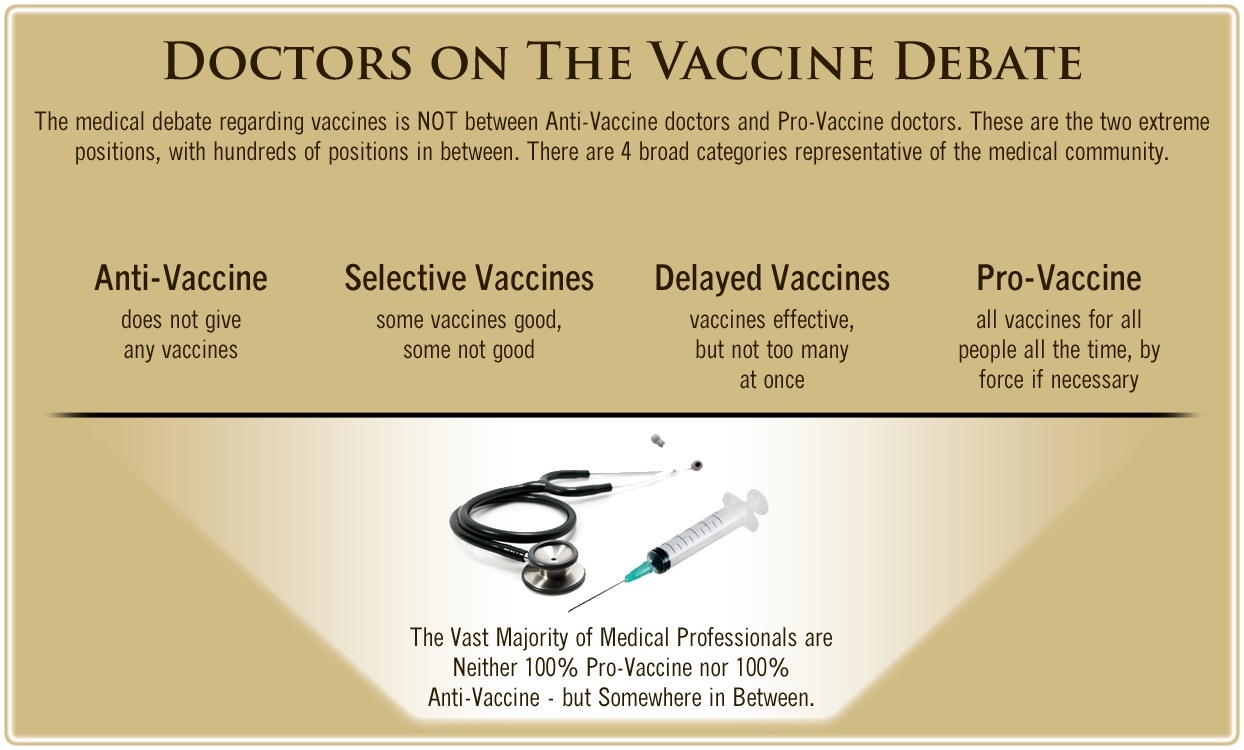
by Brian Shilhavy
Editor, Health Impact News
The popular image-sharing social media website Pinterest is blocking pins that provide safety information about vaccines, or question whether or not legislation should be passed to mandate vaccines.
When Health Impact News noticed that some of their pins were no longer showing, we contacted Pinterest to find out why.
Someone named “Tina” from Pinterest Help emailed this to Health Impact News:
One or more of your Pins about vaccines has been highlighted as containing medical misinformation. Per our policy, this content will remain available to you, but it will be hidden from circulation on Pinterest as it contains claims that are considered to be misleading or inaccurate by the medical community.
We don’t know which pins they actually blocked (we have thousands of them on their site), but a pro Big Pharma company Elsevier.com printed a commentary last year about an article published in the pro-vaccine journal Vaccine that criticized Pinterest for allowing pins that contradict Big Pharma’s pro-vaccine extremist position, or questioned parental rights in regards to vaccine choice.
In their commentary on the Journal article “On pins and needles: How vaccines are portrayed on Pinterest” they lamented:
Guidry and her colleagues collected 800 pins and analyzed them to determine whether they are pro- or anti-vaccination.
The results revealed that 75 percent of all vaccine-related pins were negative.
Rather than using social media as a tool to understand the public’s sentiment and experience with vaccines (which of course includes doctors and other medical professionals) and respect those views, this information was used as fuel to pressure lawmakers into passing laws to punish those who do not believe in the Pro Pharma extreme position on vaccines, by passing laws forcing everyone to get vaccines, whether they want them or not.
When organizations share anti-vaccine messages, the risk is that parents choose not to vaccinate their children out of fear. This lowers the overall vaccination rate and puts vulnerable people at risk of disease. There’s a pressing need to improve vaccination rates globally… (Source.)
As an example of a pin criticizing Pinterest for allowing anything but the pro-vaccine extremist position in the vaccine debate, Elsevier chose a pin from Health Impact News:

Doctors and Scientists Who Question Vaccines Continue to be Censored
The reason Pinterest gave us as to why some of our vaccine pins were being blocked is based on a false premise:
“it will be hidden from circulation on Pinterest as it contains claims that are considered to be misleading or inaccurate by the medical community.”
The fact is that the “medical community” is not at all unified on their views of vaccines, as increasingly more doctors and medical professionals are beginning to question the Big Pharma and Government extremist position on vaccines. The extremist pro-vaccine position on vaccines is:
ALL vaccines are safe and effective and good for ALL people ALL of the time, by force if necessary.
This extremist view probably represents very few in the medical community, as all 50 states currently allow vaccine exemptions to be written by medical doctors.
However, doctors who question vaccines seldom go public with their views, for fear of reprisal and the threat of losing their license to practice medicine.
As we have reported in the past many times, medical professionals and scientists are seldom 100% anti-vaccine, or 100% pro-vaccine, but somewhere in the middle.
See:
Medical Doctors Opposed to Forced Vaccinations – Should Their Views be Silenced?
Pinterest is, therefore, taking a position of censoring more than 75% of the content posted by its users (which would obviously include medical doctors, and scientists) on the vaccine debate, choosing to accept only the extremist pro-vaccine position.
Guidry and her colleagues collected 800 pins and analyzed them to determine whether they are pro- or anti-vaccination.
The results revealed that 75 percent of all vaccine-related pins were negative.
But in doing so, they are also censoring those in the medical and scientific community who have valuable public information about the risks and safety of vaccines. Even the U.S. Government is required by law to publish certain negative vaccine information, such as the quarterly Department of Justice reports listing damages paid for vaccine injuries and deaths (find them here).
Will Pinterest censor this information also based on the premise that it is “misinformation” or “inaccurate by the medical community”?
Who is Pressuring Pinterest to Censor Pins Related to Vaccine Safety and Vaccine Choice?
After reading this article to this point, I am sure many are thinking “I see anti-vaccine pins on Pinterest all the time.”
Yes, it is true that Pinterest is not censoring all pins that do not agree with the extremist pro-vaccine position.
Jeanine Guidry and her colleagues who published the 2016 study admitted that they had to collect their samples manually, “as there is not yet a code to help collect pins using a hashtag or keyword.”
It is more than likely, therefore, that Pinterest also hides pins that do not conform with the pro-vaccine extremist position manually. With much of their activity automated by computer code, it is likely that it takes a complaint about a particular pin from someone to initiate action.
A look at the Health Impact News pin (see above) that was used as an example in the Vaccine Journal article might give us a clue as to who is complaining about certain vaccine pins.
The article on Health Impact News with the Gardasil vaccine image is an article titled “Inventor of Rotavirus Vaccine Wants To End Parental Exemptions For School Vaccinations,” written by Dave Mihalovic of PreventDisease.com.
The article title is referring to pro-vaccine extremist Dr. Paul Offit, who became notorious for claiming that babies could receive up 10,000 vaccines with no side effects. He has a patent on one of the vaccines the CDC includes in the childhood vaccination schedule, so he is hardly an unbiased source of information. If Offit had his way, there would be no exemptions for vaccines at all.
Contact Pinterest and Demand They Stop Censorship on Anything Contrary to Big Pharma
Pinterest’s “Community Guidelines” were clearly written to protect the interests of Big Pharma:
We’ll take action on content spreading medical misinformation that could lead to serious harm to Pinners – for example, claims of curing diseases currently considered by the medical community to be incurable.
It would appear that the motivation behind such a policy is to prevent harm to Big Pharma and their profits, not Pinterest users and an informed public.
Pinterest has no publicly listed phone number, so to voice your disapproval of Pinterest’s actions in censoring Vaccine Safety and Vaccine Choice content, please log in to your Pinterest account and visit their Help Center.
It is well-known that the U.S. corporate-sponsored “mainstream” media censors all contrary vaccine information, so it is vitally important that the alternative media and social media remain free of censorship on the vaccine debate, so people can be aware of the fact that vaccines do carry risk of harm.
Comment on this article at HealthImpactNews.com.




